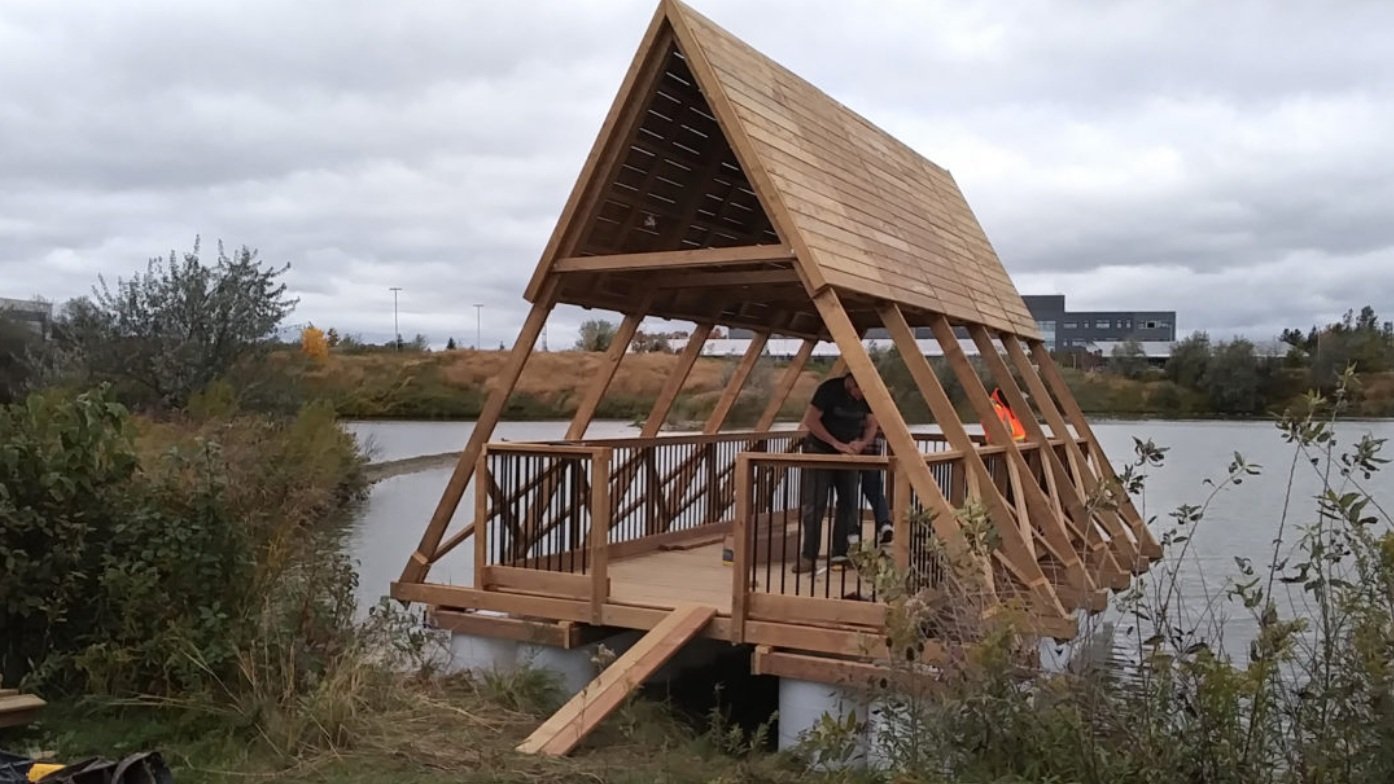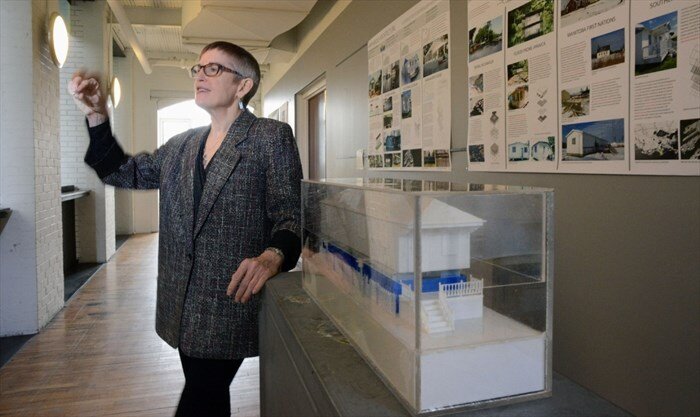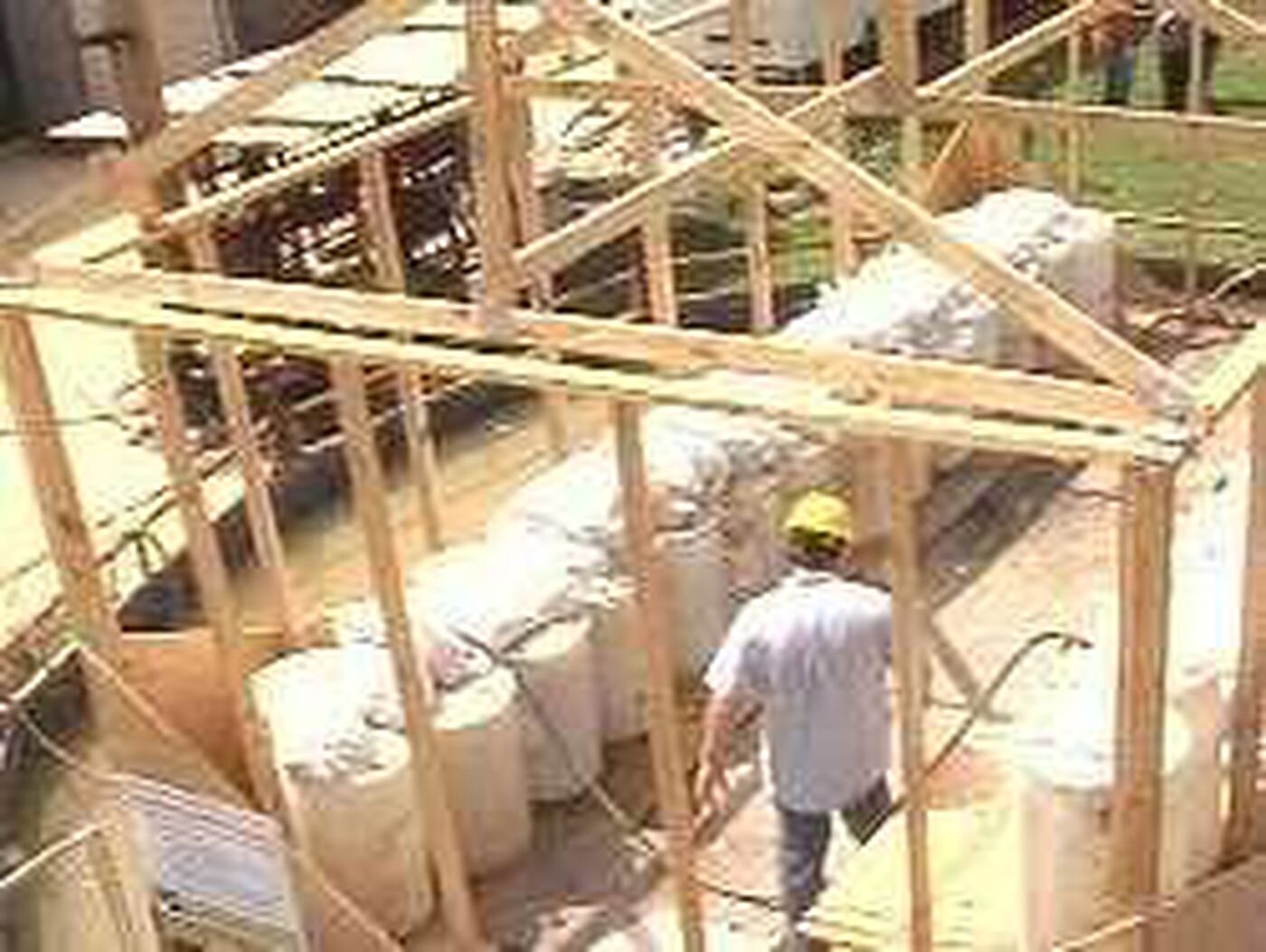FEATURED
The amphibious homes that work with water to stay afloat in floods
One solution being trialled in the Mekong delta in Vietnam is the development of amphibious homes. These float on water when the floods come but settle back onto dry land when the waters recede.
The Telegraph - September 4th, 2018
Anne Gulland
NRC invests in floating homes research as part of flood mitigation
With the support of the National Research Council of Canada, the Buoyant Foundation Project has constructed a floating pavilion to test buoyant foundations as a flood mitigation strategy for Canada’s flood zones.
The Ottawa Citizen - June 18, 2019
Andrew Duffy
A Floating House to Resist the Floods of Climate Change
As major storms become more common, could amphibious architecture keep at-risk neighbourhoods intact?
The New Yorker - January 3, 2018
Emily Anthes
Idea Watch: Amphibious Architecture
In response to an increase in the frequency and severity of major flood events, experts assemble in Ontario for the International Conference on Amphibious Architecture, Design and Engineering. Dr. Elizabeth English, who organized the conference, discusses her work building amphibious retrofits and the shifting public opinion towards amphibious architecture.
Anthropocene Magazine - September 15th, 2018
Emily Anthes
Sink or Swim
After hurricane Katrina in 2005, Dr. Elizabeth English founded the Buoyant Foundation Project as a flood mitigation method that was cost-effective, sustainable, and preserved the culture of the communities. She has since continued to develop amphibious technology to serve the most vulnerable communities in flood-prone areas worldwide.
dwell - May/June 2017
Paul Gains
What If We Just… Made Our Houses Float?
Dr. Elizabeth English joins the hosts of Life Raft Podcast on NPR for their final episode this season to discuss amphibious design as a way to increase the resilience of flood-prone communities, and its future potential and limitations.
March 9, 2021
(35:11)
Rising with the River
When Hurricane Katrina devastated Louisiana in 2005, more than a million people were forced to flee their homes. Months went by before some residents were allowed to return to the places they lived, many of which were damaged irreparably. Livelihoods and communities were lost or changed forever.
BESIDE Magazine - June 7, 2022
Casey Beal, Photos by Aaron Wynia
How homes could be retrofitted to float during floods
All around the world, nations are already preparing for, and adapting to, climate change and its impacts. This type of adaptation is hugely important. One possible type of adaptation is amphibiation, which improves flood resilience without the costs and inconveniences of static elevation.
Geographical - January 12, 2022
Bryony Cottam
Idea Watch: Amphibious Architecture
In response to an increase in the frequency and severity of major flood events, experts assemble in Ontario for the International Conference on Amphibious Architecture, Design and Engineering. Dr. Elizabeth English, who organized the conference, discusses her work building amphibious retrofits and the shifting public opinion towards amphibious architecture.
Anthropocene Magazine - September 15th, 2018
Emily Anthes
How homes could be retrofitted to float during floods
As climate change boosts the risk of flooding, researchers have come up with a way that some communities could adapt — by retrofitting their homes to float above the floodwaters. Dr. Elizabeth English, founder of the Buoyant Foundation Project, explains that it's a strategy to reduce the risk posed by flooding.
CBC News - December 16, 2021
A Tale of Two Flood Mitigation Strategies
Amphibiation or static elevation are two strategies to flood proof a home. Dr. Elizabeth English discusses the benefits and logistical hurtles that homeowners face in pursuing amphibiation.
Discover - September 2, 2021
Doug Johnson
UW Architecture Professor at Forefront of Floating Homes
Dr. Elizabeth English speaks about her work designing amphibious retrofits for homes in Vietnam, Canada, Jamaica, Nicaragua and the United States. She is currently working on developing a draft for safety guidelines for amphibious homes in Canada, an important step for the integration of amphibious architecture.
The Record - August 16, 2021
Robert Williams
The Buoyant Foundation is keeping communities afloat
Dr. Elizabeth English is pioneering the way for adaptable mitigation technologies in the face of flooding exacerbated by climate change. She speaks about her not-for-profit organization, the Buoyant Foundation Project, which is providing amphibious technologies for communities facing flooding, with a test prototype located in R+T Park, constructed with the support of the National Research Council of Canada.
David Johnson Research + Technology Park - August 9, 2021
Alex Kinsella
The Climate-Safe Houses of the Future
As climate change hits our world, our homes are increasingly under threat from flooding and other natural events. The idea of weather-resilient homes often conjures up images of futuristic cities. Some people preparing for the future, however, are less interested in high tech solutions and more interested in helping people who can only afford the basic stuff. Elizabeth English discusses how Amphibious retrofits can be an accessible low-cost solution to climate-proof against flooding.
Gizmodo - July 13, 2021
Molly Taft
Climate-Proofing Home for Extreme Weather Ahead
With research studies that predict significant rising global sea levels in the future threatening homeowners and increasing the scale of property damages, Dr. Elizabeth English proposes the inexpensive application of amphibious retrofits to protect flood-vulnerable communities, along with five more experts that offer ideas to battle other issues caused by changing climate events.
The Wall Street Journal - December 10, 2020
Benoit Morenne
Novae Res Urbis - Mitigating Risk
The Government of Ontario recently released a new flooding strategy to better assist homeowners, municipal governments, and the province’s conservation authorities in preparing for and minimizing the effects of flood damage. The new flood strategy focuses on structural modification of houses. Dr. Elizabeth English believes amphibious architecture can offer a more sustainable and resilient solution.
NRU Publishing - April 8, 2020
Andrew Reeves
A floating building? Could be the answer to our flooding woes
Cottage Life Magazine featured the Buoyant Foundation Projects’ research on amphibious construction for flood-resilient housing and the viability of retrofitting cottages with pier-and-beam construction.
Cottage Life - February 13, 2020
Leslie Garrett
Amphibious homes could cut flood risk
Dr. Elizabeth English was a guest speaker at the Lowe's Fund Breakfast seminar held in November 2017 in Toronto. She discussed her current research on building flood resilience housing for Canada, a project funded by the National Research Council of Canada and highlighted the benefits of amphibious construction for increasing flood resilience.
Thompson’s World Insurance News - November 18, 2019
A new way to make insurance for high-risk homes in flood plains affordable
At the Lowe's Fund Breakfast seminar, hosted by the Insurance Institute in Toronto, Dr. Elizabeth English presented her work on developing amphibious architecture as a means of flood mitigation.
Canadian Underwriter - November 14, 2019
Adam Malik
Expo 2020 Dubai's Global Best Practice Programme
Expo 2020 Dubai’s Global Best Practice Programme highlights projects that have provided tangible and sustainable solutions to global challenges. We are excited to announce that our project, Vulnerable in Vietnam, will be among the 25 development projects to be showcased at the Expo!
September 26, 2019
‘We Cannot Save Everything’: A Historic Neighborhood Confronts Rising Seas
The Point in Newport, R.I. is one of the largest and well-preserved Colonial-era communities in the United States. While previously protected from tourism development by the Newport Restoration Foundation, sea level rise is forcing experts to reimagine the future of historic preservation. Dr. Elizabeth English advocates for amphibious “buoyant” retrofits to protect historic structures from flood damage and preserve the original character of these neighbourhoods.
The New York Times - July 8, 2019
Cornelia Dean
NRC invests in floating homes research as part of flood mitigation strategy
Imagine a flood without sandbags, berms, pumps or panic—one that did little or no damage to waterfront homes. With the support of the National Research Council of Canada, the Buoyant Foundation Project has constructed a floating pavilion to test buoyant foundations as a flood mitigation strategy for Canada’s flood zones.
The Ottawa Citizen - June 18, 2019
Andrew Duffy
The amphibious homes that work with water to stay afloat in floods
In Vietnam houses are traditionally built on stilts to allow for the annual monsoon but this traditional form of defence has not always managed to withstand more extreme floods. The amphibious system enables homes to adjust their elevation to float over various flood levels and settle back onto dry land when the waters recede.
The Telegraph - September 4th, 2018
Anne Gulland
How floating architecture could help save cities from rising seas
The Buoyant Foundation Project retrofits existing homes with amphibious foundations to give people in flood-prone areas a less costly alternative to relocating or elevating their home. These retrofits offer an effective long-term solution to combat rising sea levels.
NBC News MACH - April 9, 2018
Kate Baggaley
Houses That Float Are What India Needs To Tackle Floods
The 2017 seasonal monsoon left Kerala in devastating condition. Amphibious architecture may offer an effective long-term solution. The Buoyant Foundation Project’s (BFP) amphibious retrofits offer a sustainable and adaptable solution.
ED Times Youth Blog - January 20, 2018
Deepa Thomas
A Floating House to Resist the Floods of Climate Change
Not long after a catastrophic thunderstorm swept through southern Ontario, bringing a month’s worth of rain in just a few hours, a group of seventy-five architects, engineers, and policymakers from sixteen countries gathered in the City of Waterloo to discuss how humanity will cope with its waterlogged future.
The New Yorker - January 3, 2018
Emily Anthes - Animation by Seb Agresti
Amphibious architecture is presented as an option for residents' homes
The City of Warton faces annual flooding and the cost of repairs has become financially draining. Dr. Elizabeth English spoke with disaster representatives and residents in December 2017 about amphibious architecture as a cost-effective flood mitigation strategy that offers a long-term sustainable solution.
Wharton Journal Spectator - December 6, 2017
Evelyn Carriere
What Can Cities Do to Go “Blue”?
Jacques Lacour and his brother, Ovide built an amphibious restaurant using a construction method native to their small community, Old River Landing, in Batchelor, Louisiana. This innovative flood mitigation strategy inspired Dr. Elizabeth English to start the Buoyant Foundation Project as a global project to help vulnerable communities withstand flooding by retrofitting their homes to become amphibious.
Smithsonian Magazine - October 2, 2017
Nathan Hurst
Floating a New Approach to Cope with Floods
In June 2017, the International Conference for Amphibious Architecture was held at St. Jerome's University at the University of Waterloo. Experts from across the globe gathered and shared ideas about the growing field of amphibious architecture.
The Record - June 23, 2017
Catherine Thompson
Sink or Swim
After hurricane Katrina in 2005, Dr. Elizabeth English founded the Buoyant Foundation Project as a flood mitigation method that was cost-effective, sustainable, and preserved the culture of the communities. She has since continued to develop amphibious technology to serve the most vulnerable communities in flood-prone areas worldwide.
dwell - May/June 2017
Paul Gains
A Local Solution to a Global Flooding Problem
Dr. Elizabeth English led a team of University of Waterloo’s School of Architecture students and faculty in the construction of a floating pavilion as an affordable solution for chronic flooding problems. This is the first steps in prototyping amphibious homes for flood-prone indigenous and low-income communities in Canada.
The Record - February 14, 2017
Greg Mercer
Amphibious Architecture in Hampton Roads?
The 14th Hamptons Roads’ Adaptation Forum “Adaptive Structure and Innovation Solutions,” was held at Hampton University, gathering industry professionals searching for a solution to Hampton Roads’ recurring flooding problem. Dr. Elizabeth English presented her work on developing amphibious architecture technology as a long-term and affordable flood mitigation strategy.
Sea Grant Virginia - October 2016
Chris Patrick
Amphibious-House Promoter is on a Crusade for New Homes and Retrofits that Go with the Flow
Featured in ENR magazine, Dr. Elizabeth English gives her insight amphibious flood-resistant buildings as a solution for flooding disasters and pushes for a reinterpretation of the statutes of the insurance program in the U.S.
Engineering News Record - August 3, 2014
Nadine Post
Floating Houses that Rise and Fall with Flood Waters
Waterloo architecture professor, Dr. Elizabeth English, says amphibious architecture can assist First Nation communities in Manitoba who reside on flood-prone land and other vulnerable communities devastated by flooding every spring from losing their homes or being displaced for long periods of time.
Waterloo Stories - March 24, 2014
Suzanne Bowness
New Orleans: No Easy Buoyancy
Dr. Elizabeth English explains how amphibious housing can offer a flood mitigation option that preserves the culture and heritage of communities.
Spacing: Understanding the Urban Landscape - Fall 2010
Elizabeth Fenuta
New Orleans: Two Years Later
The Buoyant Foundation Project developed amphibious technology to retrofit the common shotgun-style homes in New Orleans in response to Hurricane Katrina. This innovative flood mitigation technique offers a sustainable and long-term solution that can adapt to various flooding conditions.
Los Angeles Times - August 29, 2007
Richard Fausset
New Buoyant Foundation System Hopes to Save Homes From Flooding
After witnessing the devastation caused by Hurricane Katrina, Dr. Elizabeth English founded the Buoyant Foundation Project at Louisiana State University. Students and faculty constructed a floating prototype to test how a common shotgun-style home in New Orleans might be retrofitted to float during a flood.
WAFB 9 News - June 2, 2007
Maria Guerrero
Louisiana Professor Proposes Idea for Making Houses Flood Proof
A Louisiana State University engineering professor is lobbying congressional staff and Bush administration officials to push a system she says could protect many homes from the kind of disastrous flooding that occurred in Hurricane Katrina.
Seattle Times - April 28, 2007
AUDIO
Amphibious houses and floating cities could protect coastal communities from sea-level rise
To combat the some of the worst impacts of increasingly severe flooding, a new industry of floating infrastructure is emerging. There are two distinct approaches that are being put forth as possible solutions: retrofitting homes to be amphibious and building floating city blocks.
September 27, 2022
(13:26)
‘Amphibious’ houses are designed to float during flood
Dr. Elizabeth English discusses amphibious retrofit construction and its potential application for Indigenous communities with Dr. Anthony Leiserowitz of the Yale School of the Environment.
December 30, 2022
(1:30)
Buoyant Foundation Project featured on the Evan Solomon Show
Dr. Elizabeth English speaks with guest host Zain Velji about the work of the Buoyant Foundation Project and how homes could be retrofitted to float during floods.
December 20, 2021
(1:18:00)
What if we just…made our houses float?
Dr. Elizabeth English joins the hosts of Life Raft Podcast on NPR for their final episode this season to discuss amphibious design as a way to increase the resilience of flood-prone communities. She discusses her work in designing retrofits for homes in Louisiana, and the future potential and limitations of this type of flood mitigation strategy.
March 9, 2021
(35:11)
How floating homes could guard against floodwater damage
‘Humankind does the accommodation rather than trying to push the water around,’ architect says
April 26, 2019
(8:30)
Waterloo Professor Designs Floating Houses that could Weather Floods
University of Waterloo professor Elizabeth English has designed an amphibious house that floats up with rising flood waters and then settles back down on its foundation when water recedes.
April 3, 20148
(8:30)










































































